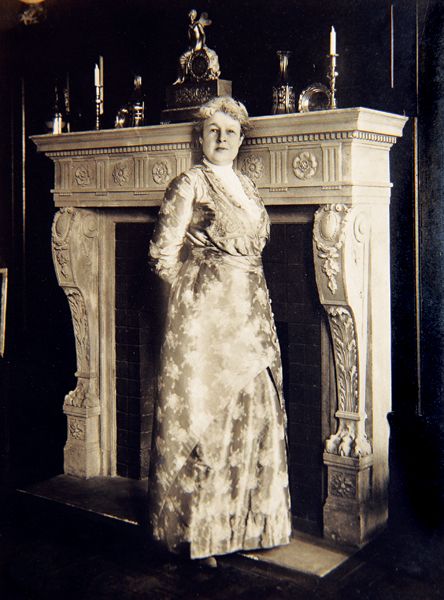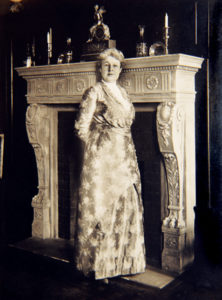Dorothy Dix
Dorothy Dix, the pseudonym of Elizabeth Meriwether Gilmer, was a writer and immensely popular advice columnist in the early twentieth century.

The Historic New Orleans Collection
Black and white reproduction of a portrait of Dorothy Dix.
Dorothy Dix, the pseudonym of Elizabeth Meriwether Gilmer, a writer and immensely popular advice columnist in the early twentieth century. Although she is little remembered today and often confused with the reformer Dorothea Dix, Dorothy Dix was, during her lifetime, Louisiana’s most famous writer. Her advice column appeared for fifty-five years and was read by people all over the world. Though her readers often thought she lived in their hometowns, she wrote her syndicated column for The Times-Picayune in New Orleans. Her picture appeared on the sides of buses in Europe; in the Philippines, she was mobbed by adoring fans. Her thinking shaped the ideas of millions of ordinary people who read her column daily.
Early Life
Dorothy Dix was born Elizabeth Meriwether on November 18, 1861, in Woodstock, Tennessee, the daughter of William Douglas Meriwether and Maria Kimbrough Winston Meriwether. She grew up in an atmosphere of genteel poverty. Her mother died when she was a teenager. The stepmother she soon acquired insisted that Elizabeth attend church but dispensed with sending her to school. However, an old relative lived on the property—a well-mannered, whiskery fellow—taught her to love Dickens, Shakespeare, and literature in general. In between her tomboy pastimes of riding and shooting, she developed a desire to write.
The woman who would become America’s expert on romance had almost none of it in her own life. At twenty-one she married George Gilmer, her stepmother’s brother, a rakish ne’er-do-well full of ambition and bravado who could not seem to hold a job. Nevertheless, it appears that she loved him steadfastly. The couple moved around constantly as he tried new business ventures; his moodiness worsened each year. It was not George, however, but Elizabeth Gilmer who had a nervous breakdown in 1893, when she was thirty-two.
Newspaper Work
Dix’s father managed to send her to the Gulf Coast for a rest. The trip was a turning point, for her neighbor in the cottage next door was Eliza Jane Nicholson, owner of New Orleans’s The Picayune. Dix showed Mrs. Nicholson one of her stories and was offered her first newspaper job—on the “Vital Statistics” page.
Dix loved newspaper work. She advanced from obituaries to recipes and then to theater reviews. Mrs. Nicholson wanted to build up female readership, and asked Dix to write an advice column that would speak to women frankly. Dix’s industry rather than her writing ability prompted this promotion, for her early articles tended to be mawkish and wordy. However, by the time she settled on a pseudonym for her column—Dorothy Dix—she was developing a straight, sharp tone that was just right for discussing the practical problems of life.
Work as a Columnist
Dix’s advice was blunt and humorous, but also sympathetic. Was it better to marry someone who adored you, she was asked, though you felt only affection for him, or to marry someone whom you adored, though his feelings were not intense? Marry the one you love, answered Dorothy Dix. “Marriage lasts a long time. It seems longer with someone who bores you.” A young man wrote that one evening he took his girl to dinner, then to the theater, then dancing. Would it have been all right to kiss her when he said goodnight? “No,” Dix answered. “I think you did enough for her.”
Crime Reporter
After five years, Dix’s column was being reprinted in several papers. Then an irresistible invitation arrived for Dix to work at the New York Journal. George eventually joined her in New York, but he resented her success. He was one of the few New Yorkers who never read anything she wrote. Dix’s first articles for the Journal were enormously popular—a series on Carrie Nation and her hatchet-wielding temperance agitators. The Journal assigned Dix to be its crime reporter. She went to jails all over the country interviewing murderers, reporting on every trial that caught the public attention: the white slaver who left pieces of a young girl’s scalp in his fireplace; the woman who lived for four years hidden in her lover’s office; the bigamist who married thirty-six women by getting them to talk about themselves.
Return to New Orleans
After seventeen years of grisly crimes, Dix had enough. She had never stopped writing her advice column, so in the 1920s she returned to New Orleans. Hundreds of letters were pouring in each week asking, mainly, how to get a husband or how to tolerate one. Dix’s own husband, in the meantime, left home one day and never came back. His relatives finally placed George in a mental institution where he died after some years, still vilifying his wife.
Dix continued dispensing sound connubial advice for several more decades. When men reached what she called “the age of indiscretion,” they had “a sudden yearning for romance—the last call to the dining car.” She urged their wives to “sit tight” for the sake of the children and wait for the phase to pass. The deadly rival that most men were sure to encounter was not tall and dark but small and pink. “The first baby for all time puts the husband’s nose out of joint.” A few words of love, she observed, were more important to a woman than having a man work himself to death for her. To men, love talk was an embarrassment they undertook so that they could find wives and never have to resort to it again. Dorothy Dix’s most popular single article was “Dictates for a Happy Life,” which included the suggestion “Make up your mind to be happy. If you are ever to be happy, it must start now, today.”
Dix’s column appeared right up to her death December 16, 1951, in New Orleans; she was ninety. She was mourned by both those who wrote her with their problems and those who read her responses.
